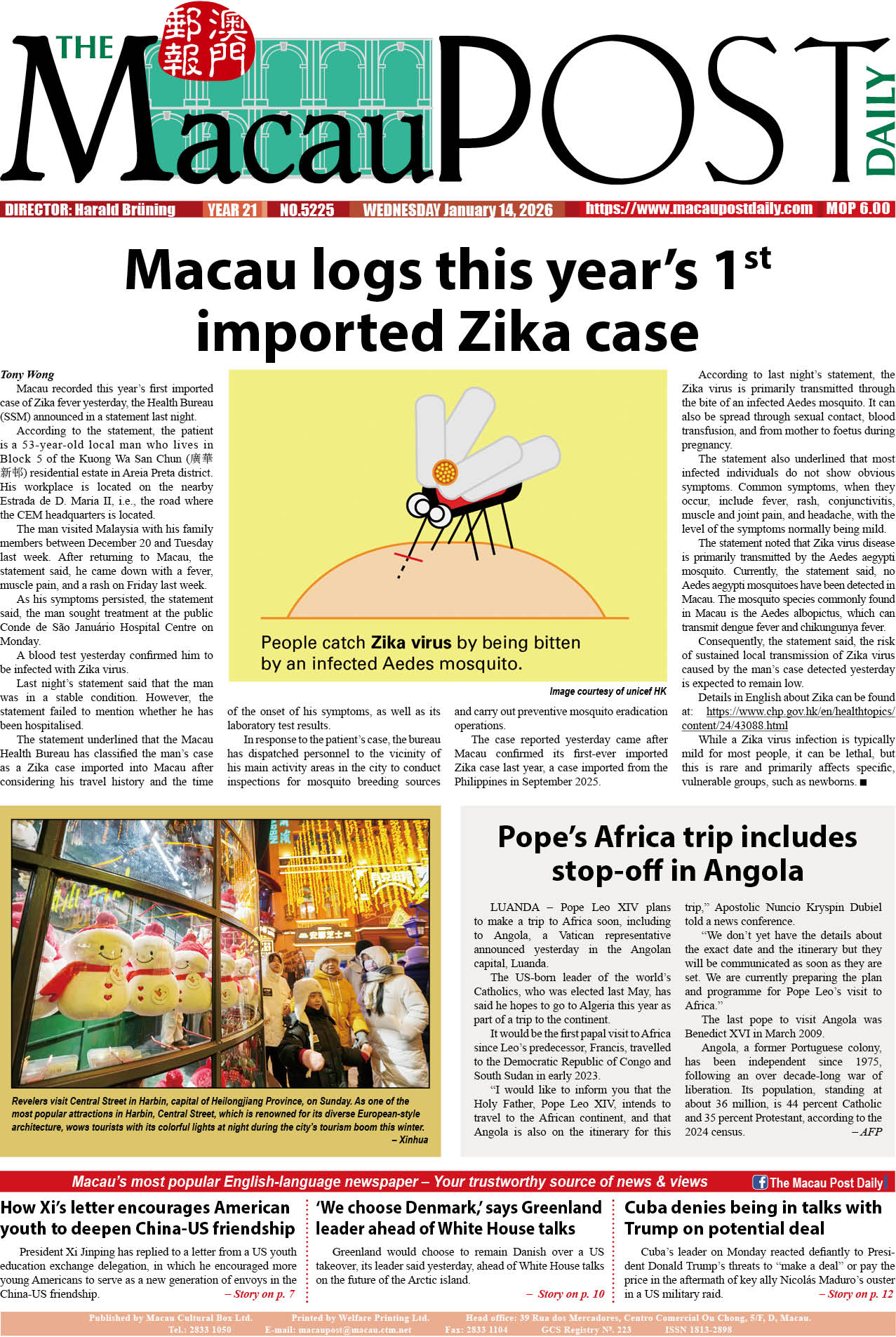Patua, Macau’s Portuguese-Asian creole, is “critically endangered”, a recently published study reaffirms.
According to the study entitled “Contact languages around the world and their levels of endangerment” by Singapore-based linguist Nala H. Lee, fewer than 50 people speak Patua (in Macau) so that “on the scale of absolute number of speakers”, the language is “severely endangered.
The study finds that Patua, the language of the Macanese community, is “critically endangered” in various aspects such as intergenerational transmission, “on the scale of speaker number trends”, “on the scale of domains of use” and in terms of “levels of endangerment and certainty of assessments of 96 contact languages” covered by the study.
The study, which was published in the online Language Documentation & Conservation Vol. 12 (2018), pp. 53-79 journal, refers to Patua as “Macau Portuguese Creole”.
The open-access journal is sponsored by the University of Hawai’i at Manoa’s National Foreign Language Resource Centre and published exclusively in electronic form by the University of Hawai’i Press:
https://scholarspace.manoa.hawaii.edu/bitstream/10125/24764/1/lee.pdf
According to the study’s introductory remarks “this paper provides an up-to-date report on the vitality or endangerment status of contact languages around the world, including pidgins, creoles, and mixed languages.”
The study assessed the 96 contact languages based on four factors: intergenerational transmission, absolute number of speakers, speaker number trends, and domains of use.
“Results show that the contact languages are most at risk with respect to intergenerational transmission and domains of use,” the introduction points out, adding that the study’s “overall results further raise the concern that the proportion of pidgins, creoles and mixed languages at some level of risk is extremely high”.
The study concludes that “the proportion of contact languages that is at some level of risk is high, at 85.4 percent (82 out of 96 languages), after which the number of safe and dormant languages and the languages for which there is not vitality information are subtracted from the total number of languages surveyed”.
Moreover, “the proportion of contact languages that is at some level of risk and already dormant is 95.8 percent (92 out of 96 languages), after the number of safe languages and the languages for which no vitality information is available is subtracted from the total number of languages surveyed”, the study concludes.
The study also underlines that at the time of writing (last year), there were 3,407 languages in the world “at various levels of risk of that are already dormant.”
According to the study, there are 6,879 languages around the world, 49.5 percent of which are either at risk or already dormant.
“What the comparison of numbers indicates then is that the risk of endangerment and loss for contact languages is essentially almost twice as great as that for all the world’s languages,” the study warns.
The author emphasises that any threat to a contact language “denotes a threat to cultural or ethnic identity,” adding that “the loss of cultural and ethnic identity is recognised as one of the major consequences of language loss”.
Besides, “contact languages too can encode various types of knowledge about the world”, the study concludes.
Encyclopedia.com defines a contact language as “a simplified variety of language that develops in situations where most speakers have no common language, such as ports, trading posts, plantations, and colonial garrison towns. It generally retains features of the varieties that contribute to it, usually local vernaculars and one or more languages brought by traders, settlers, soldiers, and missionaries.”
A Wikipedia article offers a brief introduction to Patua (which it calls “Macanese Patois”) and a bibliography on the language. https://en.wikipedia.org/wiki/Macanese_Patois
The term “Macanese” customarily refers to Macau’s Portuguese-Asian community and its sizeable Diaspora in North America, Australia, Brazil, Hong Kong, Portugal and elsewhere.
Hundreds of members of the Macanese Diaspora are estimated by some authors to still speak Patua.
Radio Macau, the Portuguese-language radio channel of government-owned broadcaster TDM, ran a story by its reporter Hugo Pinto on Lee’s study earlier this month.
The study reaffirms the UNESCO assessment in 2009 that Patua is “critically endangered”.
According to the website of the National University of Singapore, Lee, a linguist and assistant professor, is a Peranakan Chinese by birth, “interested in her endangered heritage language, Baba Malay”.
Peranakan Chinese are the descendants of Chinese immigrants who went to the Malay archipelago between the 15th and 17th centuries. “Peranakan” means “descendant” in Malay.
According to her study, Baba Malay is also “critically endangered”, being spoken by about 2,000 people in Malaysia and Singapore.
Malaccan Creole Portuguese (“Kristang”), spoken by 2,150 people, is “endangered”, the study shows.









